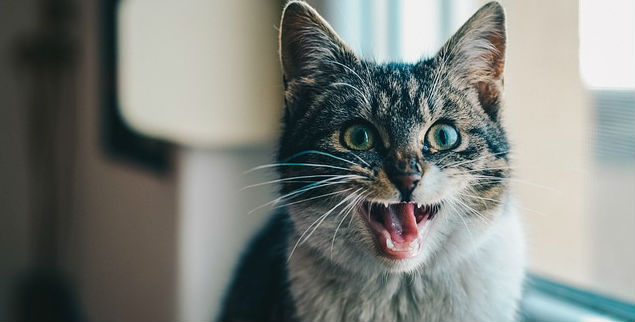Why does my cat bite me out of nowhere?
Original Question: I have a beautiful 9-month-old Tabby rescue cat. He isn't very cuddly but that’s okay. The problem is he has bitten me five times and twice badly. The first time I had to go to the doctor he only seems to bite me. I have a feeling a woman mistreated him perhaps. I don't want to send him back but I am very nervous of him when he is on the bed with me. I now have a squirt bottle of water just in case. He has a weird look about him and bites very quickly. Any suggestions would be helpful. Our previous cat lived to 17 and never even scratched me. Thank You. - Diane
 Oct 25, 2017
Oct 25, 2017
Hi Diane,
Thanks for your question. I’m sorry you’re having to deal with this, I’ll definitely be able to give you some ideas moving forward.
I get very concerned about cases like this when cats attack humans. Safety is of ultimate importance when we’re talking about the behavior of our pets. I would never tolerate an animal that could potentially harm my children. So I always take questions like this very seriously and we need to get the situation corrected.
There are lots of ways I can approach this question but since the nature of it is so serious, I’m just going to cut to the chase. This is a cat that needs intervention. We cannot allow the situation to continue. So I would go right to the strong medications. I often tell people to experiment with gentler things like supplements and behavioral modification techniques. When you’re talking about a risk to human safety I don’t think there’s time to consider those options.
I come across cats that attack people from time to time. It could be a matter of boredom, aggressive play, hunting behavior, or even a medical condition that is stressing them out. I find that a lot of cats have a threshold for interaction. If you pet a cat long enough, many of them will end up turning around and biting your hand. It’s in their nature and there are evolutionary reasons for it but it’s a common trait of many cats. Recognizing when they are reaching this threshold is important in avoiding it. Everyone wants their cat to be perfect and interactive, but many of them will set the rules for the level of engagement and intimacy. Also, keep in mind that implementing punishment such as s spray bottle could bring about more frustration and aggression. I would caution you greatly about using it.
Just to rule out medical concerns that can aggravate a cat, I will often recommend that your veterinarian collect blood and urine to do some testing for any underlying medical conditions. I can understand that getting this cat to the vet is difficult but ideally, this would be the first step. Then I would have a discussion with your vet about anti-anxiety treatments. You could start with supplements and calming techniques and devices but when it comes to human safety, I often skip right to the medicinal options because of the urgency to get it under control. Keep in mind that cat bites are very serious for humans. Cats carry an aggressive bacteria called Pasteurella multocida in their mouths that can cause serious infections for us. I have seen cat bites hospitalize people due to the infection that can result. So always take a bite seriously.
The first medication I would consider for aggressive behavior in cats is called Clomipramine. I have used it many times in cats with a similar behavior and it has worked very well. Our biggest hurdle here would be administering the medication to this cat. You would have to ask your veterinarian to have this drug formulated into a treat, a liquid or even a transdermal gel which you can rub on the ear and it will absorb through the skin. Any veterinarian will be able to do this through a compounding pharmacy. Using an anti-anxiety medication doesn’t have to be done forever. You could use it for a few months and this cat may learn to be calm. You can then remove the medication and its calm behavior typically continues.
If this isn’t an option then the only things we can do are options that I don’t like. We could turn this cat into an outdoor cat. By doing that, the environmental enrichment that it will experience may satisfy all of these intense behaviors so that they’re not directed towards you. Being an outdoor cat will increase the risk of personal injury and it’s not an ideal scenario especially if your cat has never been outdoors before. Having said that, I think you can try environmental enrichment inside your home specifically focusing on toys that keep a distance between you and your cat. For instance, using a laser pointer and running it back-and-forth along the base of the walls will really tire out your cat and hopefully get that frustration out of it. By using a toy that you don’t directly touch means that the focus is directed elsewhere rather than on you. We have a recommendation list of free cat toys that I would encourage you to check out.
Lastly, I hate to mention this but I do see people start to consider euthanasia if the cat’s behavior is bad enough. It would be my great hope that this could be dealt with without getting to that point. These are the types of situations where you can have a healthy animal and you end up being forced into considering this option. Thankfully, I have been able to work with clients and avoid this. Again, I encourage you to consider the options I presented. Every family member will have to live with this decision forever and I don’t think it will create excessive psychological damage but it would be an unsettling memory. I never sit in judgment of someone who is considering this because only that someone truly knows what it’s like to live in this scenario.
Try the first options and give them all your effort. Speak to your veterinarian about anxiety-reducing strategies and employ every one you can.
I really wish you the best with this.
Dr. Clayton Greenway


Disclaimer: healthcareforpets.com and its team of veterinarians and clinicians do not endorse any products, services, or recommended advice. All advice presented by our veterinarians, clinicians, tools, resources, etc is not meant to replace a regular physical exam and consultation with your primary veterinarian or other clinicians. We always encourage you to seek medical advice from your regular veterinarian.

